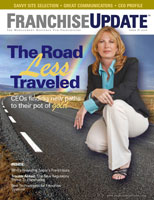Russ Cooper leads a conversion for Chester's
After 25 years in franchising, Russ Cooper, age 55, retired--but it didn't stick. "I flunked retirement, basically," he says, laughing.
"I had a great four months, but there are only so many times you can hit a golf ball and watch it go in the woods. I dropped a line and found out I wasn't a fisherman. My hobbies are really reading and playing sports, but the teams I was on were the company teams--and the guy I had worked with and mentored and developed [at GNC] was sitting in my chair, and he didn't want to leave. So I figured I better find some other things to do," he says.
Cooper discovered that he missed the daily challenges, missed making a contribution at both the personal and company level. And with all he had to offer, he would be a valuable asset to any franchisor lucky enough to lure him back into the game. Life, in the form of 40-year-old Chester the Chicken, soon provided the perfect combination of ingredients to do just that.
Chester's is a family-owned business, whose roots trace back to 1952 when W.O. Giles opened a doughnut business. The company has moved through several incarnations: incorporating as Giles Enterprises in 1965 as a cooking equipment manufacturer (and introducing Chester the Chicken); and in 1974 manufacturing and licensing chicken fryers for its own fledgling brand, Chester Fried.
By 2004, when Cooper was casting around for an opportunity, the Birmingham. Ala.-based company (renamed Chester's International LLC) had grown to more than 1,700 licensees and $700 million in revenue. Its success was based on a manufacturing and distribution model: selling its restaurant equipment, food, and supplies to licensees who operated out of convenience stores and travel plazas.
But the owners of the privately held company saw greater opportunity, and in June 2004 shifted their focus from licensing to franchising. Soon after, they made an offer to Cooper, whose experience included senior executive positions in franchising, development, and management with Shoney's, Arby's, and GNC.
Cooper not only liked the owners, but the opportunity to work in a smaller company that was "flatter" than the corporate, hierarchical environments he'd known. He was impressed by the owners' determination to make franchising their growth strategy, and by their commitment to a quality product. "They're relatively low profile," he says of Ted and Donna Giles and David Bird. "Ted's father founded the business, but really Ted and Donna and David built the business as it is today."
Also, Cooper insists, the chicken really is good. "Everyone who's at Chester's is here because of the 'Wow Factor' of our fried chicken," he says. The best way to sum it up, he says, "is one time we had a visitor. She became our franchisee and opened up in Los Angeles and said, 'You know Russ, there's no greasy aftertaste with your chicken.'"
Even the company's location played a role in Cooper's decision. His father's family was from Birmingham, and Cooper spent his first few years there before moving north. "I grew up in Wisconsin, where my mother was, but my grandparents and aunts and uncles are buried here, and I spent a big portion of my childhood visiting. So this is very much like home to me. I feel very comfortable here."
With all the right personal and business factors in place--including the chance to pioneer a new franchising program, as he did at GNC--the opportunity to join Chester's was one he didn't think he could turn down. But since he wasn't moving anywhere without his wife's blessing, when she gave Birmingham the thumbs-up, it was time to move back home.
Teaching an old chicken new tricks
Even though Chester's is the nation's fifth largest chicken franchise, "it's not a household brand by any means," says Cooper. "But we have a fantastic opportunity, in that we're a startup franchise that's really not a startup business."
Chester's, he says, is in a unique position as it enters franchising. "We are a startup in many ways in terms of being a franchisor and following the franchise business model. But we did that on a platform of hundreds of locations and having a brand that is over 40 years old, a proven operating system, proven distribution, and proven logistics."
Even then, he cautions, making it work is not a walk in the park. "You have to be selective about the individuals who join the system, give them great training, and very focused, consistent, ongoing support and assistance. There is no easy route to success in franchising. It's hard work and dedication and commitment by the franchisee themselves, and the individuals supporting the franchisees."
Chester's has stopped selling licenses and is offering existing licensees "significant financial incentives" to become franchisees, but not many are biting. "The majority of our [existing units] are very happy as a licensed operation, and they remain open and operating under a simple license agreement, which is based on a manufacturer-distribution business model."
Why no sale? For licensees, the money is good, and compared with the obligations of a franchisee, licensing is easy and licensees can get out any time. That's why, he says, "not a significant number of those have converted to franchising, nor have we pressed them to do so or pushed that as an objective. We're fine with the fact that they're operating and continue to operate. They're happy with the relationship, and we're happy with that." But any licensee opening a new location will do so as a franchisee, and that's where the incentives come in.
Nevertheless, the company's moves to build its brand through franchising has meant transitioning some licensees out of the system or converting them to franchisees. "The ones that have transitioned are ones where we felt they challenged the brand," says Cooper. The number of licensees has dropped from more than 1,700 to about 1,500 today.
Focusing on the customer
One major change for everyone--licensees, franchisees, and management alike--is the shift in focus on who "the customer" is at Chester's. Under the licensing model, the customer was the licensee, who bought equipment, food, and supplies from the company at a markup. With the commitment to franchising, that's all changed.
"The substantial reason we turned to a franchise model is so we could become more consumer-centric in our operator thinking, and in management's measurement of key performance criteria and metrics," says Cooper. And while Chester's continues to support and value its licensees, says Cooper, 100 percent of new growth will be in franchising.
"We have 1500-plus licensed locations today and 50-plus franchised locations. Five years from now I can easily see where we'd have 500-plus franchised locations and 1500 licensed locations," he says. "We have a franchise business format now, and that's what we are opening additional Chester's for."
Franchising also makes it easier to ensure brand consistency as Chester's expands. While licensed and franchised sites may differ behind the scenes, the company is delivering a unified face to its retail customers. "Everything we do today, everything marketing is all Chester's. There is no more Chester's Fried," says Cooper. "One of our major initiatives in re-engineering the brand to Chester's is to get our design, our image, a new color, a new identity as Chester's, keeping Chester the mascot as the centerpiece, and then going to Chester's uniforms, paper, packaging, marketing, promotions, visual marketing materials, signage, etc."
Changing the rules of the game
One big pressure in running a licensed business is a sensitivity to the street price of its licensed products. With downward pressure on its retail prices, the company needed to respond competitively, but had little leeway in helping its operators build a growing revenue stream and maintaining profitability.
"The franchise model is far more win-win than being a vendor to the licensee and trying to compete with other vendors, where it's usually win-lose. The customer relationship in licensing makes either the vendor feel like they're winning while the 'customer' feels like they're losing or vice versa, whereas franchising is very much a win-win," says Cooper.
"If you look at the royalty as really being an annuity, and investing in helping the franchisees succeed and building their sales, it's an insurance policy for future earnings. That's a lot more attractive than trying to be competitive on selling equipments or product."
Chester's direct competitors are anyone in the QSR chicken segment, and Cooper sees Chester with an advantage here, too. "We compete head-to-head with them on menu, but not venue," he says. So, while competitors build free-standing buildings on pricey real estate, Chester's franchisees go inline, with a footprint of roughly 1,200 square feet in a multiple-anchored power strip center.
"We can open six or seven Chester's for what it would cost to do one Kentucky Fried Chicken. So we can penetrate the market with six or seven locations instead of just one, and then there's a lot better opportunity for return on investment because first of all, the top-end pressures to generate revenue aren't as substantial, and second, you don't have all your eggs, pardon the pun, in one basket."
Operating in smaller locations also alleviates another headache common to QSRs: employees. Chester's franchisees don't require as many as their larger competitors to operate a unit. Increasing real estate prices and employee hiring and retention were challenges Cooper was familiar with, and he was not eager to re-enter franchising with a company requiring large investments in real estate or a high number of employees per shift.
Home office support becomes another challenge as the company builds a second distribution channel. "We haven't abandoned our licensed locations at all, but our mindset is 100 percent geared toward franchising and franchise development and growth through franchising," says Cooper.
So, while still providing all necessary support for its licensed locations, "We focus a lot more on local store marketing, promotions, and operation consultation with our franchise inline locations," says Cooper. "There are different levels of support. But we hire and train and retain people on the highest common denominator of support for the location, not the lowest common denominator."
Giving: he has what it takes:
Perhaps the biggest reason he failed at retirement, says Cooper, is that he likes helping people succeed, and he missed that. For Russ Cooper, it's always about the franchisees. "I spend most of my time listening and seeking first to understand the franchisee and helping them succeed. My personal mission statement has always been helping other people get what they want."
"I've always worked long hours, and franchisees take time. It's one of the reasons I'm sure I don't have children. When people ask me, I say 'I don't have time for children, I have hundreds of franchisees!' And that was really, I guess, it. I just wanted to find something where I felt I could contribute."
Which, he says, goes back to the whole point of franchising:
"I've said this ten thousand times: We're not successful till the franchisee's successful. A lot of franchisors say that because that's a cliché now in franchising. But it's a very important cliché in that it's true. When the franchisees are successful, open and operating, and building sales, then our investment in helping them achieve those revenue increases will return more to the bottom line by having royalty income increases."
Share this Feature
Recommended Reading:
FRANCHISE TOPICS
- Multi-Unit Franchising
- Get Started in Franchising
- Franchise Growth
- Franchise Operations
- Open New Units
- Franchise Leadership
- Franchise Marketing
- Technology
- Franchise Law
- Franchise Awards
- Franchise Rankings
- Franchise Trends
- Franchise Development
- Featured Franchise Stories
FEATURED IN

Franchise Update Magazine: Issue 2, 2006








 The franchise listed above are not related to or endorsed by Franchise Update or Franchise Update Media Group. We are not engaged in, supporting, or endorsing any specific franchise, business opportunity, company or individual. No statement in this site is to be construed as a recommendation. We encourage prospective franchise buyers to perform extensive due diligence when considering a franchise opportunity.
The franchise listed above are not related to or endorsed by Franchise Update or Franchise Update Media Group. We are not engaged in, supporting, or endorsing any specific franchise, business opportunity, company or individual. No statement in this site is to be construed as a recommendation. We encourage prospective franchise buyers to perform extensive due diligence when considering a franchise opportunity.